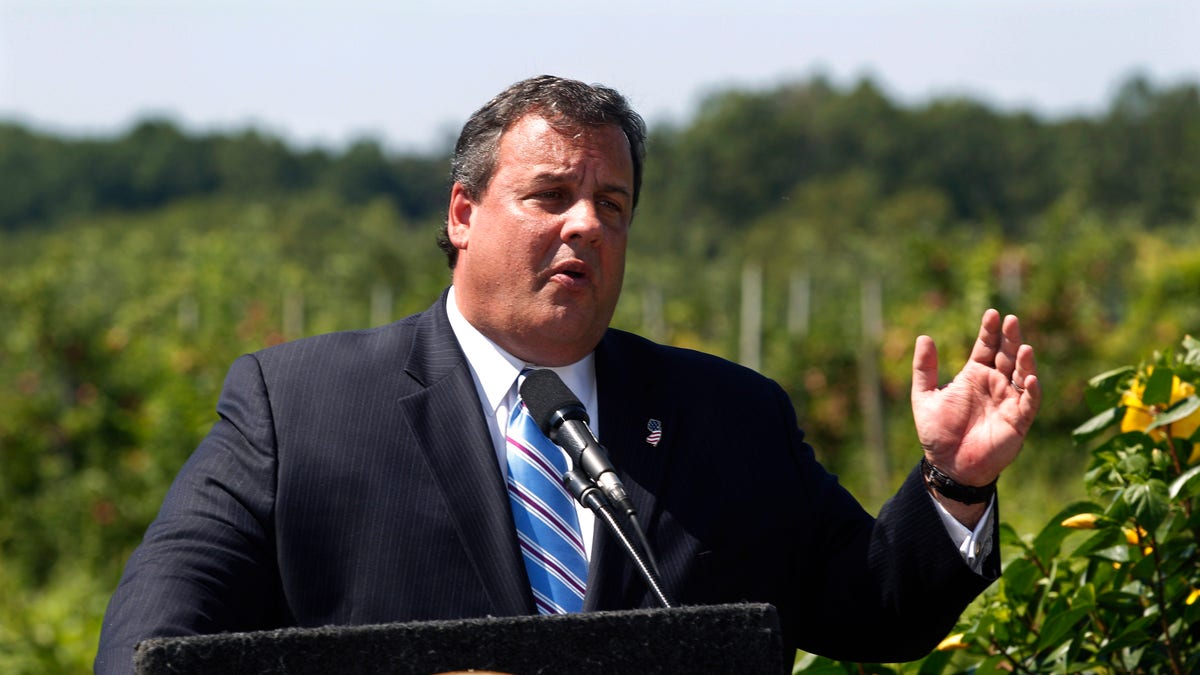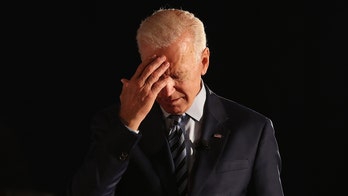
New Jersey Gov. Chris Christie stands near an orchard as he addresses a gathering Wednesday, Aug. 17, 2011, at Terhune Orchard in Princeton, N.J. (AP2011)
New Jersey Gov. Chris Christie, who took some heat last year for vacationing in Florida while a blizzard slammed the East Coast, is staying in the office this time for Hurricane Irene and taking a hands-on approach that will test his popularity as many Republicans hold out hope that he will jump into the 2012 presidential race.
“Something like this could make or break his presidential aspirations,” said Julian E. Zelizer, a Princeton University history professor who analyzes political leaders. “If he handles this poorly, every Democrat and Republican will be reminding voters.”
“This is the kind of challenge that matters to average Americans – all income brackets, all races,” he added.
While Christie isn’t the only governor bracing for the rare East Coast hurricane expected to make landfall this weekend – the chief executives of Virginia, Maryland, Pennsylvania and New York have all declared state of emergencies – he does have the highest profile as his blunt talk, confrontational style and tax-cutting zeal have made him a rising star in the Republican Party.
For the past several months, Christie has repeatedly and colorfully knocked down speculation, reports and rumors that he is weighing a White House bid – including a threat to commit suicide. But party insiders still believe there’s a good chance that Christie will end up on the 2012 presidential ticket. And if he doesn’t, there’s always 2016.
Some political analysts believe the presidential chatter and the memory of the criticism he took for vacationing last year during the blizzard have been weighing on his mind as he gets his state ready for Hurricane Irene -- a storm that could affect at least 65 million people from the Carolinas to Massachusetts.
“He can use this politically,” Zelizer said, arguing that point of view is not cynical. “This is how you measure a leader.”
If that’s true, then Christie didn’t get high marks late last year when he took his children to Disney World for a week just hours before a blizzard began to dump nearly 3 feet of snow in some parts. Christie left state Senate President Stephen Sweeney, a Democrat, in charge and said he was in constant contact with his staff and Sweeney as the storm unfolded.
“I would have been doing the same thing here as I would have been there,” Christie said at the time. “I would have been in a room someplace. I would not have been out, like driving a plow.”
But Christie is taking a different tack this time, staying in front of the cameras as he keeps residents updated on the state’s storm readiness. In news conferences and statements, he has ordered New Jersey Transit trains to stop running at noon Saturday and announced a number of measures to help people get away from the shore, including the suspension of tolls on two major evacuation routes.
“Do not try to ride it out. It is not the smart thing to do,” Christie said at a news conference on Thursday.
Christie is also weighing the possibility of relying on the National Guard’s 6,000 members to help with storm duty and moving prison inmates out of low-lying modular units.
The aggressive response could boost Christie’s approval rating in New Jersey, which is on the rise after falling to a record low earlier this year amid his push to cut education spending and state workers’ benefits.
A new Quinnipiac University Poll showed that 47 percent of registered voters approve of Christie, while 46 percent disapprove. That’s up from the 44 percent who approved in June. The poll has a margin of error of plus or minus 2.4 percentage points.
The storm’s arrival comes on the eve of the fifth anniversary of Hurricane Katrina, when President George W. Bush was slammed for what was perceived as a slow federal response.
Zelizer believes Bush’s response to Katrina is also weighing on his mind.
“Katrina is evidence how mishandling a natural disaster can be pretty devastating to a politician,” he said. “That brought down President Bush more than anything. That’s still an important memory for many Republicans and something they don’t want to repeat.”
But Ross Baker, a political scientist at Rutgers University, said he doesn’t see a lot of political significance in Christie’s actions.
“Clearly he doesn’t want to repeat what happened last year,” he said. “I think he’s just being prudent and doing what a governor does. I take his word he doesn’t want to be on the ticket in 2012. I don’t detect a political motive.”
Baker said politicians of every stripe have learned a lesson from Katrina and other responses to disasters that were heavily criticized.
“Mayors and governors have become hypervigilant and have really decided the criticism they would take for overpreparation would be relatively minor to the criticism for being unprepared,” he said.




